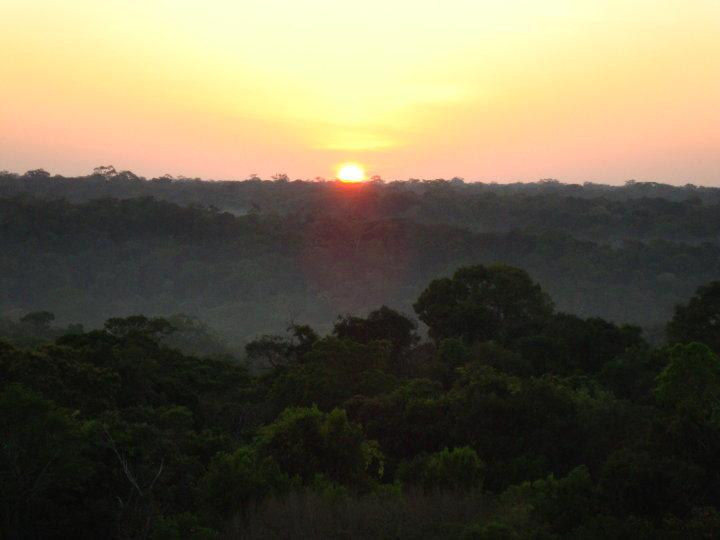
Credit: Fernanda Coelho, University of Leeds
An international team of researchers led by the University of Leeds have revealed for the first time that Amazon forests with the greatest evolutionary diversity are the most productive.
The team used long term-records from 90 plots as part of the Amazon Forest Inventory Network (RAINFOR) and ForestPlots.net to track the lives and productivity of individual trees across the Amazon region. By combining these records with DNA sequence data – which identified the evolutionary relationships among all the species – the team was able to investigate the links between how fast different forests grow and their diversity.
Their study demonstrated that the plots with the greatest evolutionary diversity were a third more productive compared to areas with the least evolutionary diversity.
The finding suggest that evolutionary diversity should be an important consideration when identifying priority areas for conservation.
Study lead author Fernanda Coelho from the School of Geography at Leeds said: “Understanding how biodiversity affects productivity in tropical forests is important because it allows us to understand how conservation strategies can best be designed to maximise protection of species and the services that these ecosystems provide.
“Our results indicate that we should include evolutionary history in conservation priorities – because ecosystem function may be higher in areas where species come from right across the tree of life’.
###
The paper Evolutionary diversity is associated with wood productivity in Amazonian forests is published 11 November 2019 in Nature Ecology & Evolution (DOI: 10.1038/s41559-019-1007-y)
Further information:
Full list of paper authors: Fernanda Coelho de Souza, Kyle G. Dexter, Oliver L. Phillips, R. Toby Pennington, Danilo Neves, Martin J. P. Sullivan, Esteban Álvarez-Dávila, Átila Alves, Ieda Amaral, Ana Andrade, Luis E. O. C. Aragao, Alejandro Araujo-Murakami, Eric J. M. M. Arets, Luzmilla Arroyo, Gerardo A. Aymard C, Olaf Bánki, Christopher Baraloto, Jorcely G. Barroso, Rene G. A. Boot, Roel J. W. Brienen, Foster Brown, José Luís L. C. Camargo, Wendeson Castro, Jerome Chave, Alvaro Cogollo, James A. Comiskey, Fernando Cornejo-Valverde, Antonio Lola da Costa, Plínio B. de Camargo, Anthony Di Fiore , Ted R. Feldpausch, David R. Galbraith, Emanuel Gloor, Rosa C. Goodman, Martin Gilpin, Rafael Herrera, Niro Higuchi, Eurídice N. Honorio Coronado, Eliana Jimenez-Rojas, Timothy J. Killeen, Susan Laurance, William F. Laurance, Gabriela Lopez-Gonzalez, Thomas E. Lovejoy, Yadvinder Malhi, Beatriz S. Marimon, Ben H. Marimon Jr, Casimiro Mendoza, Abel Monteagudo-Mendoza, David A. Neill, Percy Núñez Vargas, Maria C. Peñuela-Mora, Georgia Pickavance, John J. Pipoly III, Nigel C. A. Pitman, Lourens Poorter, Adriana Prieto, Freddy Ramirez, Anand Roopsind, Agustin Rudas, Rafael P. Salomão, Natalino Silva, Marcos Silveira, James Singh, Juliana Stropp, Hans ter Steege, John Terborgh, Raquel Thomas-Caesar, Ricardo K. Umetsu , Rodolfo V. Vasquez, Ima Célia-Vieira, Simone A. Vieira, Vincent A. Vos, Roderick J. Zagt and Timothy R. Baker
For additional information, contact University of Leeds press officer Anna Harrison via [email protected] or +44 (0)113 34 34196.
University of Leeds
The University of Leeds is one of the largest higher education institutions in the UK, with more than 38,000 students from more than 150 different countries, and a member of the Russell Group of research-intensive universities. The University plays a significant role in the Turing, Rosalind Franklin and Royce Institutes.
We are a top ten university for research and impact power in the UK, according to the 2014 Research Excellence Framework, and are in the top 100 of the QS World University Rankings 2020.
The University was awarded a Gold rating by the Government’s Teaching Excellence Framework in 2017, recognising its ‘consistently outstanding’ teaching and learning provision. Twenty-six of our academics have been awarded National Teaching Fellowships – more than any other institution in England, Northern Ireland and Wales – reflecting the excellence of our teaching. http://www.
Follow University of Leeds or tag us in to coverage: Twitter Facebook LinkedIn Instagram
Media Contact
Anna Harrison
[email protected]
44-011-334-34031
Related Journal Article
http://dx.




